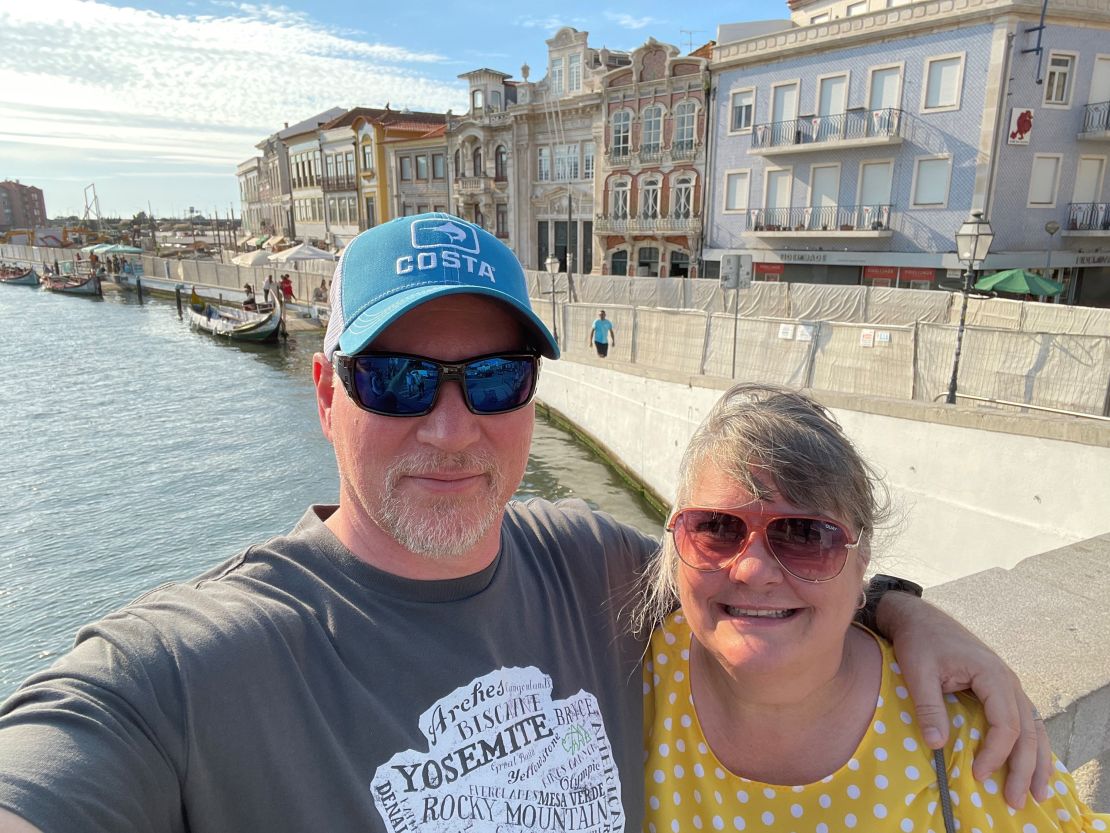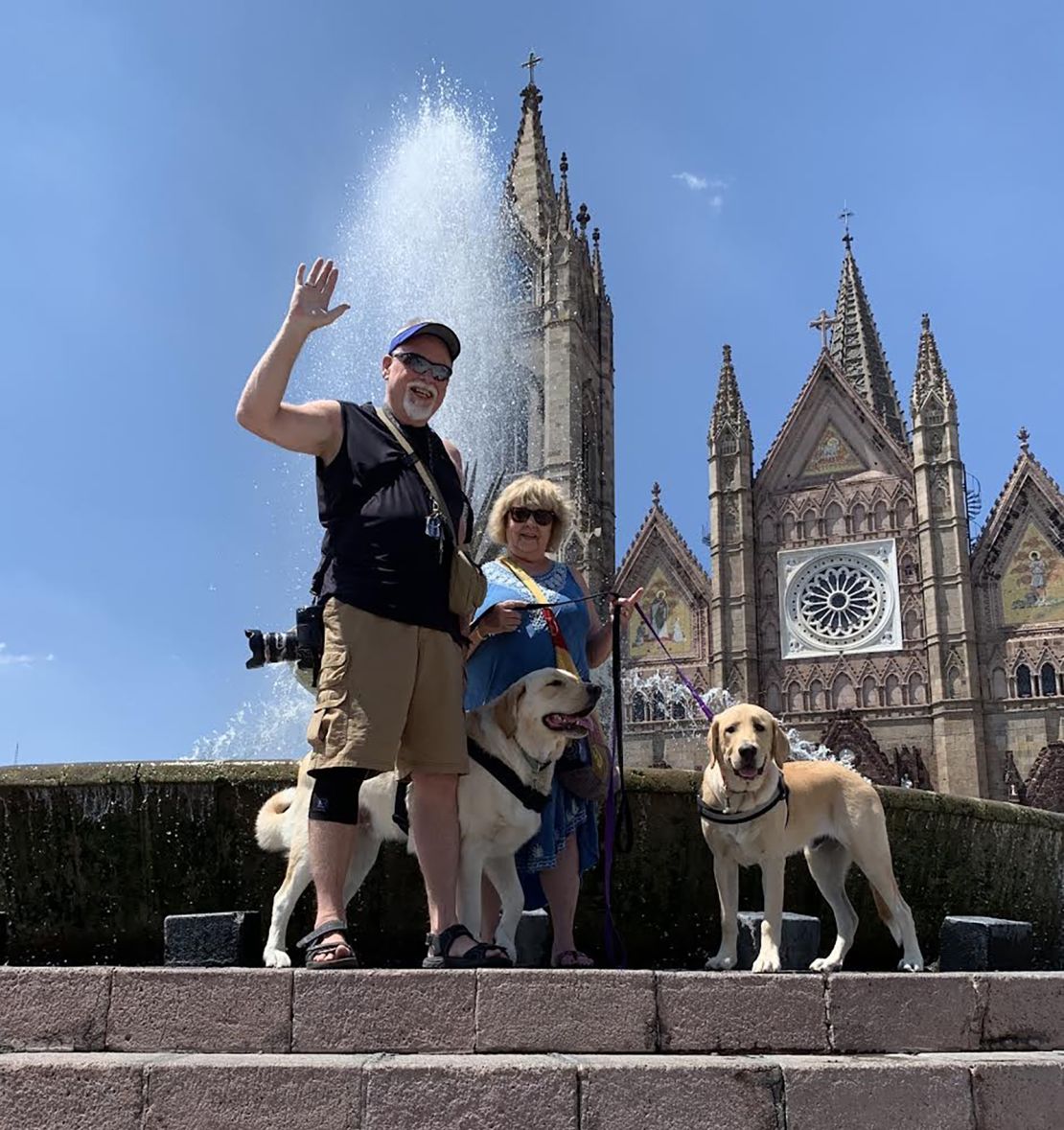Laura Barnett has always had a bit of wanderlust.
When she was a kid, her father took a job as a teacher with the US Department of Defense and moved his family from rural Kentucky to Poitiers, France, which is when the travel bug hit. She’s been to over 38 countries in her 54 years.
But during the pandemic, something changed. Travel was impossible, and her life in Fayetteville, North Carolina, started to feel small.
“I just got sick of living in suburbia. It felt like the world was potentially going to end, and I [said to my husband], ‘dude, I don’t think we’ve done everything we want to do.’” She brought up the idea of moving to Portugal.
As America’s retirement crisis grows, so too does the dream of retiring abroad where cities are walkable, social services plentiful and the cost of living affordable: Gelato in the piazza, white sand and year-round sun, little villages tucked into ocean coves and cheap health care all sound pretty good.
But while retirees might imagine spending their golden years full of pasta and palazzos, the realities of moving abroad are much less romantic. There’s often more bureaucracy than bruschetta.

Laura’s husband, Chris, was initially skeptical about the move. He didn’t think retiring abroad was feasible. Plus, they’d be leaving behind their two sons and two grandsons.
But Laura persisted. “We’ve done everything they told us to do. We’ve saved our money. We’ve worked for the same company for decades. We’ve done everything, and I keep looking to the future — and I can’t stomach having to work until I’m 65 years old just because we can’t afford health care otherwise,” she said.
“[The US] has set up a system where even if we have the money to cover our day-to-day expenses — rent, food, travel — all of a sudden there’s this other line item called health care. That’s about $1,500 a month, more than our house payment.”
Chris and Laura have traveled to Portugal three times to look for places to settle and have a three-year plan set in place to move there permanently.
There are a lot of upsides: The weather is favorable year-round, it’s affordable, private health insurance costs about $300 per month for couples and there’s a better sense of work-life balance. (CNN converted prices throughout this story into US dollars from local currencies.)
But there are also some downsides. Leaving behind family is a big one.
Until the Barnetts receive their residency card, they’ll only be allowed to leave and enter Portugal twice, and their initial arrival into the country counts.
“We have aging parents in their late 80s.?Not having the freedom to easily respond if we are needed until we have that card is very concerning. Being lonely and not having friends and having to start from scratch with that is also in this mix,” said Laura.
Portuguese is not an easy language to learn, and adapting to a new culture late in life won’t be easy. Recent revisions to Portuguese immigration programs also make the tax situation much less favorable for Americans.
But in the end, the finances won out.
“Our goal, which is very doable based on research, is to live on less than $3,500 per month in Portugal while still being able to afford travel in Europe,” said Laura.
Their financial adviser told them that to comfortably retire in the US, they’d need to have about double that amount — $7,000 per month.
Packing up shop
As America’s retirement crisis grows, so too does the dream of retiring abroad.
It’s becoming increasingly expensive to retire in the US. Just 43% of non-retired adults in the US think they will have enough money to live comfortably when they retire, according to Gallup in 2023. That’s the lowest level for that metric since 2012.
At the same time, the number of Americans looking to settle outside of the country has tripled over the past 30 years, according to a 2024 Monmouth poll. The number of Social Security recipients living outside the US increased from 307,000 in 2008 to more than 450,000 in 2022.
Some countries are even taking advantage of this boom and have eased their visa requirements to attract older US expats.
But packing up a life and moving it abroad is not a simple task, and retirees often find themselves in over their heads.
“People need to think about estate planning, which is often different abroad,” said Brett Spencer, the founder of Impact Financial, a financial advisory firm that specializes in Americans living abroad. “They need to think about currency, complicated taxes and their investments. Even opening a bank account abroad can be complicated.”
Spencer says he’s had clients who have had their bank accounts closed with no warning, leaving them working through nuanced protocol in another language and without access to any funds. These types of complications aren’t uncommon.
Escape to Italy

Patience Dunbar, who will be 63 next month, and her husband, Charles Ippoliti, 69, have been living full time in Arona, a lakeside town in northern Italy, since 2022. Their typical day consists of coffee and the crossword, a leisurely stroll around the lake, stops at the local outdoor market for fresh fruit and vegetables and a lunch in the town square. Occasionally, they’ll take the train into Milan, about 40 minutes away.
“It’s a very leisurely pace,” said Charles.
They feel healthier than they did back home, they’ve lost weight and they are exercising more. That’s part of the reason they decided to look abroad in the first place.
In 2020, when the couple was living in Oregon, Charles suffered from severe Covid complications. He was hospitalized for a few weeks and then put on oxygen at home for a few more.
“We thought ‘well this is silly, why are we wasting our time?’ As soon as we could we decided to make the most of this,” said Patience. “I didn’t want to wait five more years until Charles was in his late 70s to retire. What if he’s not able to enjoy those years?”
The pair applied for their codice fiscale, similar to a Social Security number, and purchased their apartment in Arona.
They paid about $72,000 for their first apartment there and later sold it and upgraded to a larger home for $160,000. The food is less expensive and a fancy dinner with wine runs them about $55.
Most importantly, they pay $2,200 a year for their health care. That includes visits with specialists for Charles, who has a heart condition.
But it’s hard to be away from family, and they have struggled to learn Italian. They thought the language would come more easily.
Dealing with the government can be troubling at times, and filing paperwork has become a full-time job for them. Plus, they’re starting to worry about the political landscape. Giorgia Meloni, a far-right leader, is the current Italian premier and has anti-immigration views. They worry that policy could change and they might have to go back to the States.
We’re not in Kansas anymore
“I would say that, without a doubt, whatever lifestyle you want, you’ll be able to find it at a lower cost than you could in the United States,” said Kathleen Peddicord, the founder and CEO of advisory firm Live and Invest Overseas.
“Unless the lifestyle you want is living in a small town in the Midwest,” she added. “If what you want in retirement is to live in a small town, surrounded by your family and your grandkids, that’s great.”
Living abroad isn’t for everyone. It probably won’t work for those who seek out creature comforts in their retirement.
“It’s hard work. I think that’s the reality that a lot of people probably aren’t prepared for,” said Peddicord, who splits her time with her husband between Paris and Panama City, Panama.
Some people Peddicord advises don’t make it to another country because they get burned out by the loads of administrative work involved.
“You have to create a whole new life for yourself in a very short space of time, in another culture, in another language,” she said. “All of the things that you do to create your life in the States: You got a driver’s license at 15 or 16, you opened a bank account, you got your first credit card, you bought a car, you rented a house, you paid utilities, you did all that over time. Now you have to do it at once and without the support of friends and family.”
Many people who make the move end up feeling isolated and lonely.
Still, Peddicord says her business has exploded as more Americans retire abroad, and a cottage industry to help people navigate the nuances of the task has quickly sprung up.
South of the border

As retirement decisions loomed for Bill and Jacki Dahl, now 69 and 75, respectively, they were forced to confront the fact that their retirement income would not continue to support the same lifestyle they had enjoyed in the US while working.
They decided that moving to a less expensive country was a good way to stretch their dollar and keep their lifestyle the same.
After four years of research and four exploratory trips, they made the move to Querétaro, a city in the center of Mexico.
In 2019, the Dahls sold nearly everything they had accumulated during 30 years of marriage — including their home in Oregon — to fund the trip, said goodbye to their four children and grandchildren, and drove to Mexico. Upon arriving, they finalized their official immigration documents — they’re both “residente-permanente,” permanent residents, meaning they’re still US citizens.
They rent a three-bedroom, two-story home with a large garden for about $940 a month. Food is cheap, and they have Medicare so that they can return to the United States for any serious medical care. But for smaller things, they remain local — it costs about $35 to visit the dentist, for example.
“We live on a fixed monthly income,” said Bill. “We do not have a bunch of savings. We do not have a bunch of investments,” but they’re able to get by and still have money left over for travel and adventure.
“We both adore people, art, food, travel and cultural diversity,” said Bill. “We love it here.”
Still, it hasn’t been smooth sailing.
“Relocation to Mexico is not for everyone,” he warned.
Climate change means that there are more droughts in Mexico and more pollution, water can be scarce, and sometimes the power goes out, said Bill.
Another surprise for the Dahls has been the rising strength of the peso against the US dollar. Bill estimates that his purchasing power is now worth about 30% less than it was before the pandemic.
The financial requirements for legal, permanent residency in Mexico have also increased substantially, and immigration services are “cumbersome and inefficient,” said Bill. Violence is on the rise ahead of national elections later this year, he added.
It’s not for the faint of heart, or people who want a carefree retirement, he said.
But, he added, “we have no desire whatsoever to return to live in the US…we are deeply grateful to be resident-guests of such a marvelous place to live during the retirement season of our life.”








